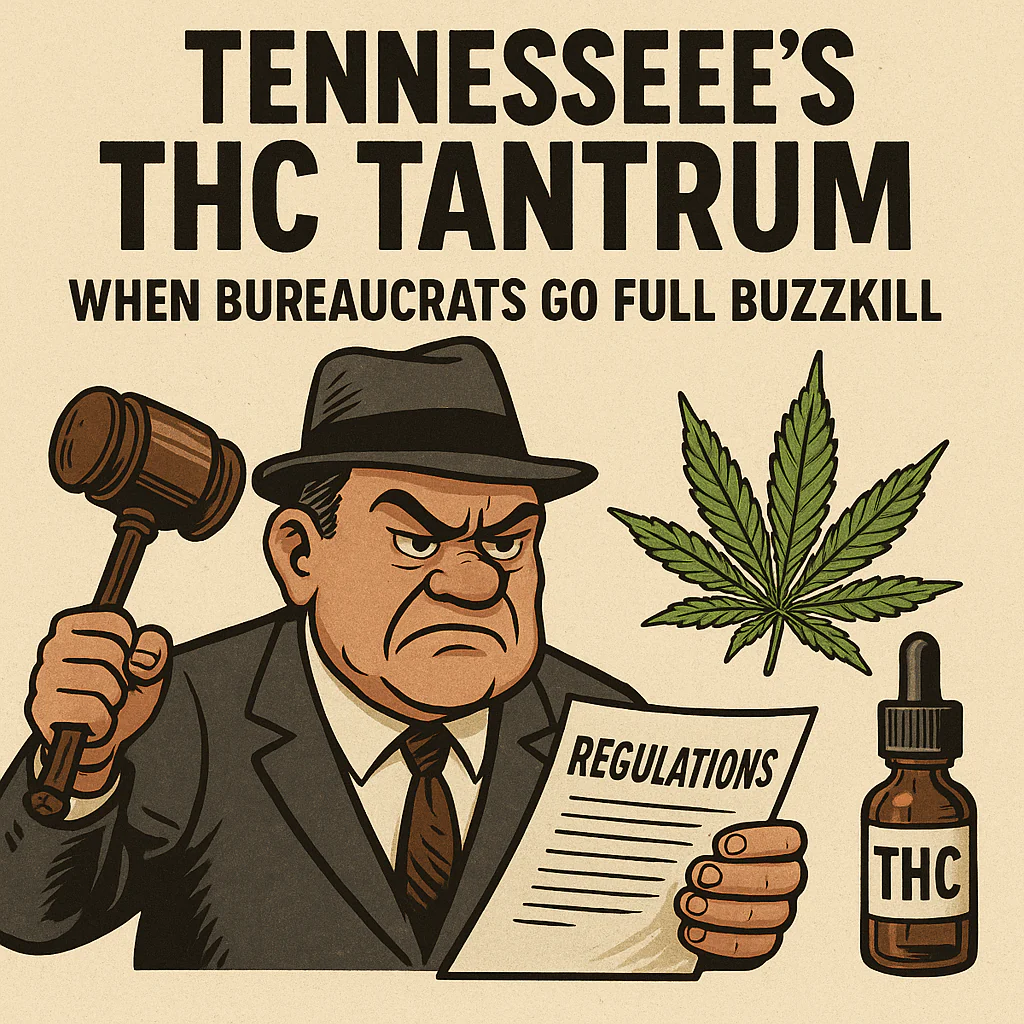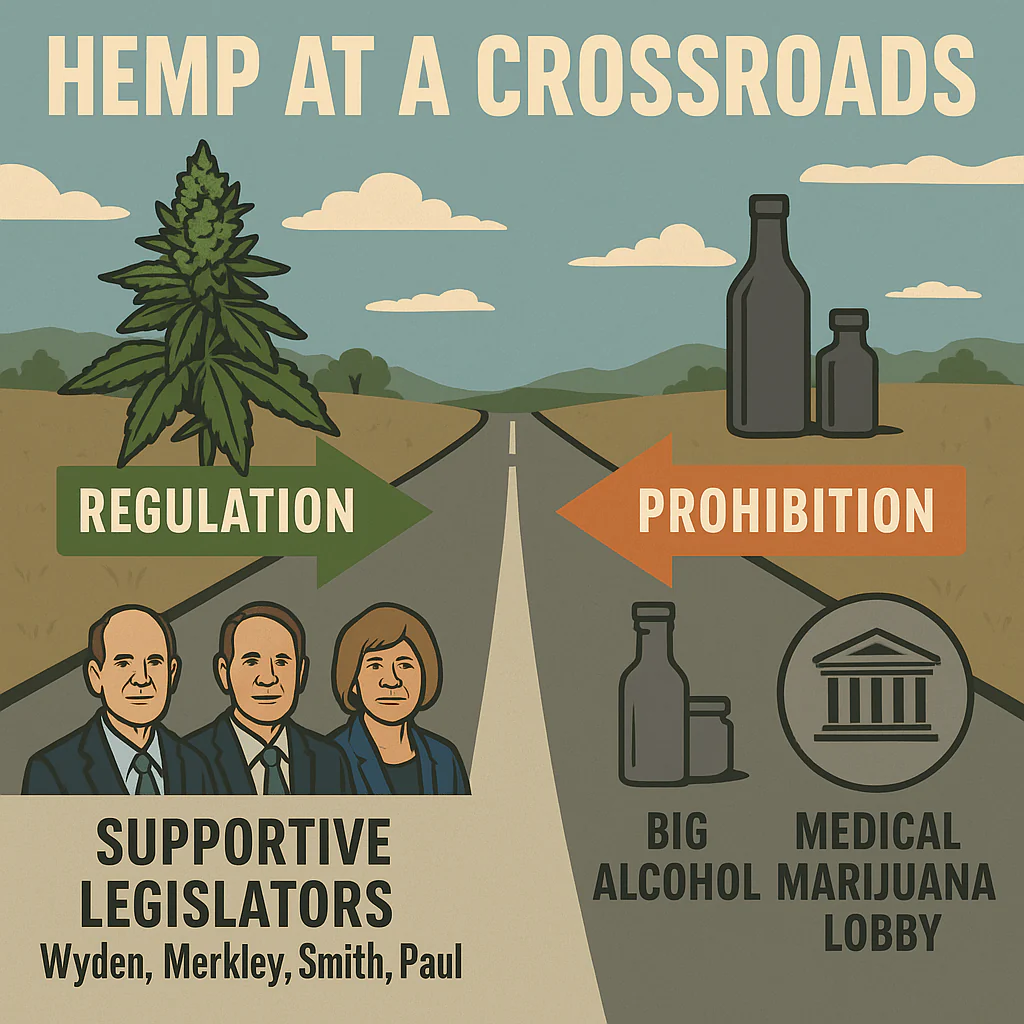In the summer of 2018, Nothing But Hemp was born. It wasn’t just the start of a company — it was the start of a fight. And I’ll be honest with you: ever since that day, it feels like someone has had us in their sights. Regulators, boards, politicians, and now even competitors — every year, it’s something new.
But here’s the thing: being in the crosshairs? That’s the job description when you’re in hemp.
And right now, we’re not just talking about Minnesota battles. We’re staring down something bigger — a federal ban that could wipe this entire industry off the map. The only way through it? Advocacy. Voices. Pressure. And yes, that means you.
Let me back up and explain.
2018: Baptism by Fire
Our first big scare came right out of the gate. Minnesota’s Hemp Bill had language that would have made every hemp business “illegal” overnight. It required “accurate labeling” but gave no variance — no 10%, no 15%. One tiny lab discrepancy and poof — you’re done.
I didn’t know the first thing about lobbying back then. I didn’t know where to park at the Capitol, let alone how to talk to lawmakers. But I wasn’t about to let my business die before it had a chance to grow.
So I started the Minnesota Hemp Association. We had no money. No roadmap. But we had fire. We organized, we showed up, and we educated lawmakers who didn’t even know hemp was different from marijuana. Eventually, we fixed the language. That was my first taste of advocacy. Trial by fire.
COVID, Delta-8, and the Pharmacy Board Showdown
During COVID, regulators left us alone. New cannabinoids were popping up, and then came Delta-8. Those were golden years for hemp — strong sales, innovation, excitement.
But the party didn’t last. At the tail end of COVID, the Minnesota Pharmacy Board decided the whole hemp industry was “illegal.
Back then, there were only about 20 hemp shops in the state. Today, there are over 6,000 businesses in this space. But in that moment, we were exposed.
A handful of us — maybe five companies — regrouped what was left of the Hemp Association. I hired lobbyist Jason Tarasek, got legal backup from Susan Burns, and we went to work. Out of that fight came what people now call the Low-Dose THC Bill — the spark that lit the hemp beverage boom across the nation.
We didn’t plan that. We weren’t trying to launch a national movement. We were just trying to protect our shops. We asked for 10mg THC per serving; they gave us 5mg. We took the deal. At the time, it felt like survival. Looking back, we changed the industry.
HF100: Taking Fire
Then came HF100. One of the toughest fights of my career. People attacked me, said I was against legalization, threatened me, even sent death threats. But I don’t back down.
HF100 gutted us. We lost tinctures. We lost hemp flower. My best-selling beverage enhancer got pulled because regulators said it was “over the limit” — even though it was 3mg per serving. No one drinks a whole bottle of tincture in one sitting, but they banned it anyway.
The next year, we fought to win products back and increase milligrams on non psychoactive cannabinoids — and we did. But lawmakers piled on restrictions: making imports difficult, forcing Minnesota-only lab testing (which kills competitiveness/lead times), and exposing trade secrets with new labeling rules.
Today: A New Kind of Crosshairs
The fight hasn’t slowed. It’s only changed shape.
In Minnesota, the pressure isn’t just from regulators—it’s also about how we choose to respond. A client who hasn’t traditionally engaged in lobbying would prefer to take a more collaborative path with the OCM. They believe regulators may be open to adjusting their approach on testing rollout.
I respect that perspective, and I’m giving it space. But experience tells me this: if regulators had the authority or willingness to change timelines simply by request, we likely would have seen that already. Many stakeholders have consistently raised the same three concerns—testing, imports, and label requirements unrelated to safety—and so far, those conversations haven’t led to meaningful adjustments.
That said, I’m open to compromise. I’ve given two weeks for this approach to play out. If it gains traction, that’s a win for everyone. If not, we’ll move forward with stronger action.
The Federal Ban: The Real Crosshairs
All of this — Minnesota fights, Pharmacy Board battles, even HF100 — pales in comparison to what’s coming next: the looming federal ban on hemp-derived THC products.
Let me be blunt: if Congress decides to crack down, everything we’ve built could vanish. Every hemp shop, every brand, every beverage on every liquor store shelf — gone.
This isn’t just another scare. This is existential.
Who’s Going to Save the Day?
The good news is, we’re not alone. Two groups are leading the charge in D.C.:
-
The US Hemp Roundtable — a coalition that has been fighting for hemp since the 2018 Farm Bill. They know the landscape. They’ve got the experience.
-
HIFA (Hemp Industries & Farmers Association) — a newer but powerful voice bringing farmers, brands, and advocates together.
-
The American Healthy Alternatives Association (AHAA) is a national trade group advocating for fair regulation, consumer safety, and responsible growth in the hemp and wellness industries.
These groups are in the trenches right now, but here’s the truth: they can’t do it without you. Lobbyists open the doors, but it’s your voice that makes lawmakers pay attention.
I can’t stress this enough: Congress needs to hear from you.
Advocacy Isn’t Boring — It’s a Rush
Look, I get it. Calling your congressperson doesn’t sound fun. Nobody’s lining up saying, “Oh boy, can’t wait to send another email to a senator.”
But here’s the truth: advocacy is not boring. Advocacy is a rush. It’s like being back in the Marine Corps, running into fire instead of away from it. Every call, every email, every meeting is another bullet dodged, another step forward.
And when lawmakers actually listen? When language changes because of something you said? That’s better than any adrenaline shot you’ll ever get.
Why Your Voice Matters
Here’s how Congress works: if they hear from a handful of lobbyists, they nod politely and move on. But if they hear from hundreds of their own constituents? They perk up. They realize this issue isn’t abstract. It’s voters. It’s real businesses. It’s jobs in their district.
Think about it: you don’t have to be a policy expert. You don’t need to know every line of the Farm Bill. You just need to say, “This matters to me. I own a business. I have customers. I have employees. Don’t take this away.”
That’s it. That’s the power of advocacy.
Don’t Sit This Out
Here’s the thing: a lot of people in this industry are hoping someone else fights for them. They say, “Well, the Roundtable’s got it. HIFA’s on it. Someone else will make the calls.”
That’s not how this works. If you’re sitting on the sidelines, you’re part of the problem.
This is a war for the survival of hemp. And wars aren’t won by spectators.
Let’s Make It Fun (Yes, Fun)
You want to make a difference? Here’s how to make it fun:
-
Host a “call your congressperson” happy hour at your shop. Everyone brings their phone, dials in, and orders a Delta-9 seltzer while they’re on hold.
-
Post your advocacy letters on social media. Tag your lawmakers. Show your customers you’re fighting for them.
-
Challenge your team: who can get the most calls in a week? Winner gets bragging rights and a case of your best-selling beverage.
You don’t have to treat advocacy like homework. Treat it like what it is: survival with a sense of humor.
The Crosshairs Are the Job
At the end of the day, this is what being in hemp means: living in the crosshairs. Regulators, politicians, even other businesses — they’ll all try to take their shot.
But we don’t run. We fight. We rebuild. We adapt.
As a Marine, I learned one thing: when you’re under fire, you don’t freeze. You move. You press forward. You run into the fire.
That’s how we survive. That’s how we win.
The Ask: Get Loud, Get Active
So here’s my ask to you: don’t wait.
-
Call your representative.
-
Email your senator. https://hempsupporter.com/federal-action/
-
Support the US Hemp Roundtable, HIFA and/or AHAA
-
Show up. Speak out. Be loud.
Because the only way we survive this federal crosshair is if we stand together — not just me, not just lobbyists, not just the associations, but all of us.
We’ve come too far to let Congress erase us. We’ve built businesses, jobs, and communities. We’ve given people alternatives, relief, and even joy.
Now it’s time to fight for it.
Final Word:
Being in the crosshairs isn’t easy. It never has been. But it’s where I thrive. And if you’re in hemp, it’s where you need to thrive too.
So pick up the phone. Fire off that email. Join the fight. Because the crosshairs are on us — and together, we can push forward anyway.








































